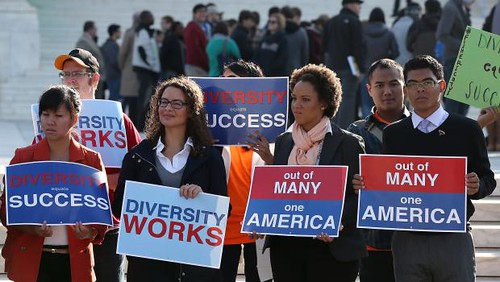
Students demonstrate in favor of affirmative action in Washington, D.C. The Supreme Court is taking up the issue in relations to a case involving the University of Texas., a photo by Pan-African News Wire File Photos on Flickr.
November 15, 2012 at 4:40 pm
Michigan's affirmative action ban unconstitutional, federal appeals court rules
By Christine Ferretti and Maureen Feighan
The Detroit News
Cincinnati — A federal appeals court has thrown out Michigan's voter-approved ban on affirmative action in college admissions and public hiring.
The court ruled the 2006 amendment to the Michigan Constitution is illegal because it presents an extraordinary burden to opponents, who would have to mount their own long, expensive campaign to protect affirmative action.
The Sixth U.S. Circuit Court of Appeals in Cincinnati said Thursday that the burden undermines a federal right that all citizens "have equal access to the tools of political change."
"Obviously, this is a tremendous victory for the young civil rights movement, for the black and Latino students who fought for affirmative action," said George Washington, a Detroit-based lawyer who argued to have the law overturned on behalf of the group By Any Means Necessary.
"It means thousands of black and Latino students will now have the chance to go to the most selective colleges and graduate schools, including the University of Michigan.
"This is a tremendous victory not only for Michigan, but for the entire country."
Michigan voters in 2006 amended the constitution to ban the consideration of race in college admissions and government hiring. It forced the University of Michigan and other public schools to change policies.
Washington argued before the federal appeals court in March that the law violates the U.S. Constitution's guarantee of equal protection to all citizens.
Mark Rosenbaum, a lawyer for the American Civil Liberties Union, also praised Thursday's decision to strike down the ban.
"It reaffirms the cornerstone principal of our democracy: the political process must be open to all Americans and race is not to be disadvantaged when universities seek to promote diversity," said Rosenbaum, who argued the case and is also a University of Michigan professor. "Somewhere, I'm quite certain Lincoln and Dr. King are smiling."
Attorney General Bill Schuette announced Thursday that he intends to file a petition with the U.S. Supreme Court within 90 days to appeal the 8-7 split ruling by the federal appeals court to overturn the Michigan Civil Rights Initiative.
"MCRI embodies the fundamental premise of what America is all about: equal opportunity under the law," Schuette said in a written statement. "Entrance to our great universities must be based upon merit. We are prepared to take the fight for equality, fairness and the rule of law to the U.S. Supreme Court."
The University of Michigan declined to provide an immediate comment on Thursday's ruling and its ramifications.
"It is an extensive ruling, with what appear to be several individual opinions," said university spokesman Rick Fitzgerald. "It will take some time to fully review and consider its ramifications."
The 15-member appeals court reopened the case after throwing out a decision by one of its three-judge panels last year that said the law is unconstitutional and unfair to minorities.
The case follows a long history of legal maneuvers in Michigan that began with a class-action lawsuit in 1997.
It was filed by former Southgate resident Jennifer Gratz, a white woman who led the challenge to U-M's consideration of race in admissions after she received a rejection letter. A month later, Gratz and another white student, who also was rejected, filed a lawsuit against U-M Law School.
The cases made it to the U.S. Supreme Court, which issued a landmark ruling in 2003 that universities could not use a point-scoring system but could use other ways to consider race in admissions.
Affirmative action opponents then collected enough signatures to put the issue on the Michigan ballot in 2006 and broadened restrictions by including gender and government hiring.
Gratz called Thursday's ruling "outrageous," but added she wasn't surprised.
"At oral arguments, the court was deeply divided over the wrong reasons," said Gratz, who now resides in Florida. "There were numerous questions from judges on whether the people of Michigan have the right to vote on this issue or if the regents have the supreme right on this issue. I think the court absolutely got it wrong. Voters in Michigan have the supreme authority over U of M regents to determine that their colleges and universities should treat people fairly and equally. I will continue this fight."
Voters approved the ballot issue, 58 percent to 42 percent. Two subsequent lawsuits challenging the law were filed by U-M students and faculty and BAMN, an activist youth organization. The suits were combined.
The suits led to a decision in July 2011 by a three-judge federal appeals court panel, which struck down Michigan's constitutional amendment, saying it violated the equal protection clause of the 14th Amendment.
Bill Schuette also appealed that ruling.
cferretti@detroitnews.com
(313) 222-2069
Detroit News staff writer Kim Kozlowski and the Associated Press contributed.
From The Detroit News: http://www.detroitnews.com/article/20121115/METRO/211150455#ixzz2CLOicjNp
No comments:
Post a Comment